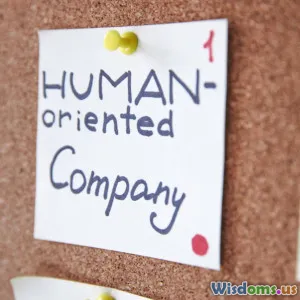
Are Your High Expectations Ruining Your Work Happiness
16 min read Explore how high expectations can impact your work happiness and discover practical solutions for finding balance, fulfillment, and sustainable success in the workplace. (0 Reviews)
Are Your High Expectations Ruining Your Work Happiness?
The excitement of new opportunities often fills us with hope and drive. Yet, beneath aspiration lurks a subtle saboteur—a set of high expectations that turn joy into frustration, accomplishment into perpetual dissatisfaction. Are your ambitious standards silently eroding your work happiness? Let's explore the psychological dynamics, workplace trends, and real-life strategies to help you recalibrate, ensuring your expectations empower instead of overshadow your professional contentment.
Understanding the Roots of High Expectations

High expectations don't materialize out of thin air—they brew from personal history, company cultures valuing excellence, or even societal trends glorifying overachievement. For instance, in Silicon Valley, startups like Google and Tesla have built identities around innovation and 80-hour work weeks, instilling a narrative where "exceptional" becomes the basic standard.
But there's a catch: perfectionism, often lauded on resumes, has a dark side. Psychologist Dr. Gordon Flett notes that perfectionistic tendencies are closely linked to burnout and reduced satisfaction. It's not just about aiming high—it's about whether those aims are realistic. While striving for improvement drives progress, demands that skirt the boundaries of the possible can generate constant anxiety and dissatisfaction.
The Expectation Gap: How Disparity Breeds Discontent

Workplace disappointment often grows from the "expectation gap"—the disconnect between what you anticipate and what materializes. When a manager expects rapid career progression, only to discover lateral movement, or when efforts outshine recognition, a sense of unfairness can infest even the most congenial work environments.
Consider Sophia, a sales executive. She led her department to record-breaking numbers but, due to restructuring, her promised promotion got shelved. Her expectations, set by encouraging management, weren't met, souring her achievements and fueling resentment. This misalignment is not rare: According to a 2023 Gallup report, only 32% of American workers felt their employers delivered on the opportunities first promised to them.
Managing this gap involves two steps: clarifying what is actually within your control and re-examining whether your benchmarks are based on facts, company realities, or just personal ideals. Shifting this perspective moderates disappointment and opens space for the appreciation of small wins.
Perfectionism in Action: When Good Isn't Good Enough

The myth of constant perfection creates a treadmill effect: no matter how fast you move or how much you accomplish, the bar always seems to move out of reach. Perfectionistic workplaces, especially in auditing, law, or graphic design, reward painstaking detail. However, they also nurture a fear of mistakes, stifling creativity and innovation.
For example, at a global law firm, junior associates routinely lose sleep triple-checking documents, terrified of letting a small error slip. The pursuit of a flawless client brief becomes so consuming that accumulation of errors from fatigue becomes more likely, paradoxically making perfection unattainable.
To break free, psychological research recommends setting SMART (Specific, Measurable, Achievable, Relevant, Time-bound) goals over ambiguous calls for 'excellence.' Embracing the concept of 'good enough' might sound regressive, but it's been shown to improve output quality and morale once the dumper of perfectionism is lifted.
The Impact on Mental Well-being and Job Performance

The mental calculus of high expectations is costly: the World Health Organization recognizes burnout as an occupational phenomenon characterized by exhaustion, cynicism, and declining efficacy. High self-imposed standards, coupled with external pressures, push people past their mental limits.
According to a 2024 study published in the Journal of Occupational Health, employees who self-identified as having "unrealistically high standards" were 40% more likely to report chronic stress and absenteeism. Mental fatigue spirals—when people constantly feel they're falling short, their confidence and productivity tank, creating a self-fulfilling prophecy of underachievement.
Simple interventions like regular breaks, mindfulness techniques, and clearer communication about expectations reduce these risks. Organizations that actively acknowledge employee boundaries and prioritize workload balance, like Basecamp or Buffer, report higher satisfaction and retention than those ignoring psychological health.
Harmonizing Ambition with Realism: Practical Mindset Shifts

Ambition is not inherently problematic; it's the framework you use to interpret its outcomes that matters most. Recalibrating expectations doesn't mean settling for mediocrity, but making peace with incremental progress and re-centering on growth as a process, not a destination.
Try adopting a growth mindset, as described by psychologist Carol Dweck—the belief that skills can be developed over time through effort and learning from mistakes. Employees at Microsoft credit the company's shift to growth-mindset-based reviews for a more constructive, less stressful work culture. Feedback moves from "You missed this mark" to "Let's focus on your improvement trajectory."
Another actionable approach: replace fixed standards like "I must always outperform my peers" with process goals—"Every month, I'll refine my workflow by identifying one area for small improvement." Recognize emotional triggers that fuel expectation surges (social media, peer achievements), and use them as reminders to self-reflect, not self-criticize.
The Social Comparison Trap: External Pressures That Sabotage Satisfaction

In the age of professional networks and social platforms, it's easy to curate a picture of flawless success. Celebratory posts about promotions and awards can drive even self-assured professionals into toxic comparison spirals. Research from the Journal of Applied Psychology shows that the more often employees checked LinkedIn, the greater their dissatisfaction with their own career progress—even when their objective accomplishments were significant.
One illustrative story comes from Amit, an engineer whose impressive accomplishments were consistently downplayed in his mind because others in his cohort flashy posted their job switches to top firms. He realized that these posts never reflected the daily setbacks, rejections, or trade-offs on the other side of the highlight reel.
To counteract this, pause to remind yourself that success is multi-faceted and often unshared in its messy entirety. Consider limiting professional social media time if you notice it feeding unhealthy expectation comparisons, and focus instead on tangible metrics within your own control.
How High Expectations Impact Team Dynamics

Unmanaged expectations don't just affect personal wellbeing; they ripple outward, straining teamwork. High expectations set without clear alignment foster resentment and blame. Talent, not deploying as anticipated, begins to bruise team dynamics.
A classic case arose within a product team at a fast-growing SaaS startup. One ambitious lead, believing quick feature rollouts marked the company as innovative, pressed relentlessly for near-impossible deadlines. The result was increasing conflict in the ranks, missed milestones, and eroding trust. Team morale tanked, while attrition rose—a pattern reflected in organizational psychology literature: chronic overreach leads to diminished engagement and collaboration breakdown.
Leaders can remedy this by facilitating expectation-setting sessions—open forums for clarifying what is possible, jointly agreeing on priorities, and collectively defining success. When teams participate in the process, they invest in shared, sustainable outcomes.
Navigating Feedback and Self-Evaluation for Long-term Confidence

Receiving feedback can feel particularly bruising when high expectations make any critique sting like failure. The key is learning to differentiate between constructive suggestions and unreasonable demands.
Susan, a marketing VP, used to dread performance reviews, seeing any advice for improvement as evidence of inadequacy. Upon reframing feedback as guidance, not indictment, she started documenting her wins alongside areas for growth, giving equal narrative weight to both. This balance reduced overemphasis on limitations and made professional development less intimidating.
Annual or quarterly self-reviews using a strengths-and-needs approach can reinforce an accurate self-image. Rather than "How did I fall short?", ask "Where have I made progress, and what am I excited to tackle next?" Reevaluate success from the perspective of learning, not just outcomes.
Strategies for Resetting Expectations Without Sacrificing Drive

Finding the sweet spot between drive and contentment is a skill. Here are actionable strategies you can implement starting this week:
-
Set layered goals: Combine ambitious project aims with achievable, shorter-term milestones. Celebrate the completion of each, not just the final outcome. This approach is common in software development (Agile sprints) and consistently improves morale.
-
Prioritize feedback from valued sources: Seek critique from mentors and team leads with full context of your work, rather than taking every opinion to heart. This helps parse helpful input from noise.
-
Build time for review and gratitude: Scheduling weekly reflection allows comparison not just against abstract ideals, but actual measurable improvement. Keep a wins-Journal.
-
Seek organizational fit: Match your personal ambition with company culture. Innovative companies like Atlassian or American Express openly communicate promotion timelines, helping employees form realistic expectations.
-
Use failure as fuel: Redefine unmet expectations as data, not defeat. Each misstep illuminates what to adjust next.
Employing these methods turns expectations from abstract stressors into concrete motivators aligned with both joy and productivity.
When to Seek Professional Help: Expectations and Mental Health

If recalibrating your standards feels impossible or if work dissatisfaction becomes overwhelming despite best efforts, professional support is vital. Burnout isn't conquered with willpower alone. Resources like Employee Assistance Programs, in-house counseling, or theraputic coaching can equip you with coping strategies grounded in evidence-based practices.
It's also useful to educate managers and HR leaders about the ripple effects of mismatched expectations—by establishing mental health days, flexible work options, and clearer feedback channels, workplaces can become safer spaces for ambition nurtured by realism.
Making Expectations Work For You—Not Against You

Expectations guide us—they offer direction and spark action. Yet, when untethered from reality or left unchecked, even the loftiest ambitions can obscure the fulfillment already within reach. By cultivating self-awareness, staying attuned to shifting realities, and celebrating all gradients of progress, you can preserve both your work drive and your happiness.
Your ambition continues to matter—it just doesn’t need to come at the cost of your well-being. In empowering yourself to recalibrate expectations, you lay groundwork for both present satisfaction and sustainable career growth. After all, the happiest professionals aren’t those with the lowest standards or the highest—just those with the wisest expectations.
Rate the Post
User Reviews
Popular Posts



















